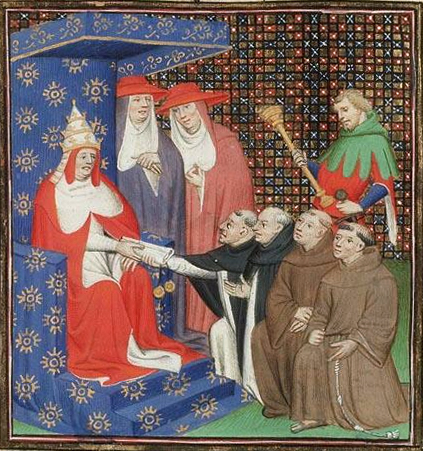 In 1246, Europe was pretty scared. The Mongol horde had appeared out of the steppes of Asia, and seemed to be an unstoppable military force bent on destruction and conquest. The Russian states had already fallen, and the armies of Eastern Europe were facing defeat. Things were not looking good, and there seemed to be no hope of stopping the Mongolians from marching all the way to the shores of the Atlantic (and then, presumably, turning around and killing everyone a second time on their way back home).
In 1246, Europe was pretty scared. The Mongol horde had appeared out of the steppes of Asia, and seemed to be an unstoppable military force bent on destruction and conquest. The Russian states had already fallen, and the armies of Eastern Europe were facing defeat. Things were not looking good, and there seemed to be no hope of stopping the Mongolians from marching all the way to the shores of the Atlantic (and then, presumably, turning around and killing everyone a second time on their way back home).Pope Innocent IV, being the leader of Catholic Europe, decided it was time for action. Given that beating the Mongol armies back with force didn't seem to be working, he turned to the only other tactic available: a sternly-worded letter. Innocent penned a letter to the Great Khan (Genghis was dead at this point, as was his son Ögedei, so his grandson Güyük was next in line), in which he took the opportunity to "...express in strong terms our amazement that you, as we have heard, have invaded many countries belonging both to Christians and to others and are laying them waste in a horrible desolation..." He then proceeded to kindly ask the Mongols to cut the crap, saying, that he "...admonish, beg and earnestly beseech all of you that for the future you desist entirely from assaults of this kind..."
The Pope then gave the letter to a friar named Giovanni and sent him off to deliver it, which required travelling all the way from Rome to actual Mongolia - a trek of 3,000 miles which took them over 100 days, all for a letter which, for all they knew, may well have gotten them executed.
Güyük, as the two umlauts in his name would generally indicate, was not a man to be messed with. The Pope's stern tone did not, as it turned out, convince him or his people to stop their conquering spree (which at this point had been going strong for 40 years), or to apologize for any feelings they may have hurt along the way. Instead, Güyük sent the emissaries back with a letter of his own (the original copy of which is still in the Vatican archives), in which he interpreted the Pope's letter as an offer of submission, and demanded that the Pope and all the kings of Christendom personally travel to Mongolia so that they could bow before him. The letter ended with a pretty clear threat: "If you fail to act in accordance therewith, how can we foresee what will happen to you? Heaven alone knows."
Güyük died only two years later, before he could make good on this threat. Although the Mongols continued to menace Eastern Europe, they never returned with the same unstoppable force as they previously possessed. Europe was spared, and the Pope never had to share the fate of the Islamic Caliph Al-Musta'sim whose similarly disobedient attitude resulted in him being wrapped in a rug and trampled to death by Mongol cavalry.
No comments:
Post a Comment